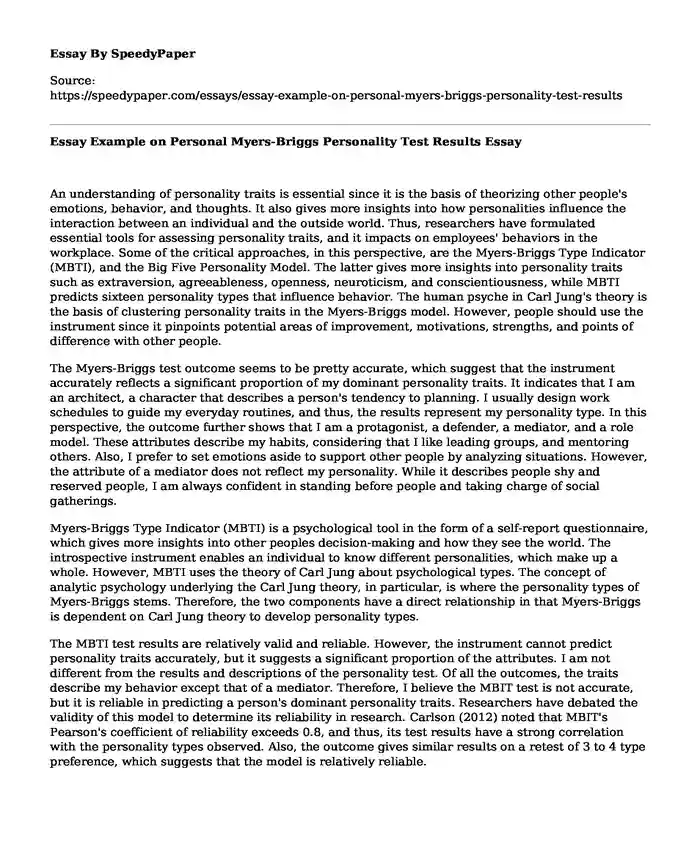
| Type of paper: | Essay |
| Categories: | Psychology Analysis Personality |
| Pages: | 3 |
| Wordcount: | 604 words |
An understanding of personality traits is essential since it is the basis of theorizing other people's emotions, behavior, and thoughts. It also gives more insights into how personalities influence the interaction between an individual and the outside world. Thus, researchers have formulated essential tools for assessing personality traits, and it impacts on employees' behaviors in the workplace. Some of the critical approaches, in this perspective, are the Myers-Briggs Type Indicator (MBTI), and the Big Five Personality Model. The latter gives more insights into personality traits such as extraversion, agreeableness, openness, neuroticism, and conscientiousness, while MBTI predicts sixteen personality types that influence behavior. The human psyche in Carl Jung's theory is the basis of clustering personality traits in the Myers-Briggs model. However, people should use the instrument since it pinpoints potential areas of improvement, motivations, strengths, and points of difference with other people.
The Myers-Briggs test outcome seems to be pretty accurate, which suggest that the instrument accurately reflects a significant proportion of my dominant personality traits. It indicates that I am an architect, a character that describes a person's tendency to planning. I usually design work schedules to guide my everyday routines, and thus, the results represent my personality type. In this perspective, the outcome further shows that I am a protagonist, a defender, a mediator, and a role model. These attributes describe my habits, considering that I like leading groups, and mentoring others. Also, I prefer to set emotions aside to support other people by analyzing situations. However, the attribute of a mediator does not reflect my personality. While it describes people shy and reserved people, I am always confident in standing before people and taking charge of social gatherings.
Myers-Briggs Type Indicator (MBTI) is a psychological tool in the form of a self-report questionnaire, which gives more insights into other peoples decision-making and how they see the world. The introspective instrument enables an individual to know different personalities, which make up a whole. However, MBTI uses the theory of Carl Jung about psychological types. The concept of analytic psychology underlying the Carl Jung theory, in particular, is where the personality types of Myers-Briggs stems. Therefore, the two components have a direct relationship in that Myers-Briggs is dependent on Carl Jung theory to develop personality types.
The MBTI test results are relatively valid and reliable. However, the instrument cannot predict personality traits accurately, but it suggests a significant proportion of the attributes. I am not different from the results and descriptions of the personality test. Of all the outcomes, the traits describe my behavior except that of a mediator. Therefore, I believe the MBIT test is not accurate, but it is reliable in predicting a person's dominant personality traits. Researchers have debated the validity of this model to determine its reliability in research. Carlson (2012) noted that MBIT's Pearson's coefficient of reliability exceeds 0.8, and thus, its test results have a strong correlation with the personality types observed. Also, the outcome gives similar results on a retest of 3 to 4 type preference, which suggests that the model is relatively reliable.
Conclusion
Conclusively, the personality test shows that I am a mediator, architect, a defender, a protagonist, and a role model. I agree with the outcome except for the trait of being a mediator. These attributes describe my habits while in school, home, and workplace. MBIT, however, uses the concepts of other theories to assess personality traits. In this case, it has a direct connection with Carl Jung model, which provides a theoretical background for establishing personality traits.
References
Carlson, J. G. (2012). Recent assessments of the Myers-Briggs type indicator. Journal of personality assessment, 49(4), 356-365. DOI: 10.1207/s15327752jpa4904_3
Cite this page
Essay Example on Personal Myers-Briggs Personality Test Results. (2023, Jan 28). Retrieved from https://speedypaper.com/essays/essay-example-on-personal-myers-briggs-personality-test-results
Request Removal
If you are the original author of this essay and no longer wish to have it published on the SpeedyPaper website, please click below to request its removal:
- Essay Example Containing Political Psychology Questions
- HR Essay Example: Managing and Appraising Employee Performance
- Comparison Essay Example: America's Economy vs. Venezuela's Economy
- Nursing Essay Sample: Disregard for Informed Consent, Responsibility and Accountability, Ethical Practice
- Essay Example about Marketing Mix in Global Marketing
- Essay Example on Current Trends in the Retail Industry
- Essay Sample: Good Communication Skills and Knowledge Aid in Solving Problems
Popular categories




